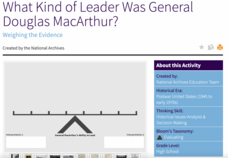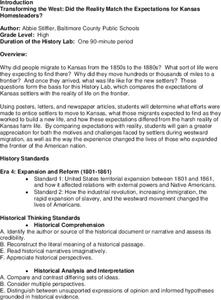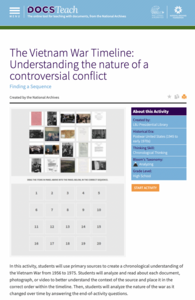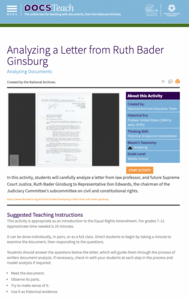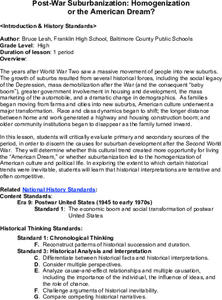American Institute of Physics
Physicist Activist: Dr. Elmer Imes and the Civil Rights Case of Juliette Derricotte
Elmer Imes was not only a brilliant physicist but also a civil rights activist. After an introductory lecture, groups read two articles about a traffic accident that killed one Fisk University student and injured several others. The...
American Institute of Physics
Historical Detective: Edward Alexander Bouchet and the Washington-Du Bois Debate over African-American Education
Young scientists meet Edward Alexander Bouchet who, in 1876, was the first African American to receive a PhD in Physics. This two-part lesson first looks at the debate between Booker T. Washington and W.E.B. Du Bois about the type of...
American Institute of Physics
African Americans and Life in a Secret City
Imagine the lure of being offered a job at a secret site, working on a secret project, and earning higher wages! Such was the approach used to recruit African Americans to Hanford, Washington, one of several sites used to develop...
K20 LEARN
The Tulsa Race Massacre
The 1921 Tulsa Race Massacre is the focus of a lesson that explores the causes and consequences of the destruction of the Greenwood section of Tulsa, Oklahoma. Pupils examine primary source images, a video clip covering the riots, and...
National Park Service
Remembering Pearl Harbor: The USS Arizona Memorial
Young historians use primary source materials to investigate the 1941 attack on Pearl Harbor and the sinking of the USS Arizona. After reading background articles and studying maps and images of the attack, class members consider whether...
Center for History Education
U.S. Foreign Policy and the Iran-Contra Affair: Was Oliver North a Patriot, a Pawn, or an Outlaw?
If you had to write a song about Oliver North, would it be a ballad or a dirge? If you had to put him on a trading card, would he be a hero or the bad guy? Young historians decide for themselves after examining documents from the...
Center for History Education
Cold War Case Files: The Rosenberg Trial - Was Justice Fairly Served?
The Rosenbergs—executed for their role in a Soviet-era spy ring—continue the captivate the American imagination. Using a history lab format, young historians examine the trove of documents associated with the case, including photographs...
Center for History Education
To What Extent Were Women's Contributions to World War II Industries Valued?
Women rose to the challenge when the nation's war effort called them—but were sent home when the GIs came back from World War II. Young historians consider whether the United States valued women's contributions during the war using a...
DocsTeach
How Have Americans Responded to Immigration?
While America says it welcomes from other countries the tired and poor yearning to be free, the record is mixed on whether there has been a warm reception for immigrants. Class members use an interactive graphic scale and primary source...
Center for History Education
Guatemalan Coup of 1954: How Did the Cold War Influence American Foreign Policy Decisions?
Was it all about the bananas—or the fear of a communist threat? Young historians use a history lab to examine documents from the American-led 1954 Guatemalan coup. Using graphics, government documents, and speeches, they examine the...
DocsTeach
What Kind of Leader Was General Douglas MacArthur?
For five decades, General Douglas MacArthur shaped US military involvement around the world. His career ended when he went toe to toe with President Dwight Eisenhower over the Korean War. Young historians evaluate the complicated command...
Center for History Education
The Triangle Shirtwaist Factory Fire: Is Anyone to be Punished for This?
The stories of bodies falling to the pavement and girls dying in their seats echo to the present day. The New York City Triangle Shirtwaist Factory fire—which killed 147 people, mostly young women and girls—galvanized the labor movement...
Center for History Education
Transforming the West: Did the Reality Match the Expectations for Kansas Homesteaders?
They expected good soil and hearty crops ... but they found buffalo chips and grasshopper plagues. Using an advertisement encouraging famers to go west, budding historians examine primary sources including letters, photographs, and...
The Formation of the Western Alliance, 1948–1949
Silence is golden—even when debating post World War II foreign policy. Using a silent debate format, young historians deliberate whether the United States should have kept a foothold in West Germany after World War II. A series of videos...
PBS
Decoding Media Bias
Alternative facts? After watching the We The Voters film, "MediOcracy," viewers compare how cable news outlets CNN, Fox News, and MSNBC report the same story about politics or public policy. After a whole-class discussion of their...
DocsTeach
The Vietnam War Timeline: Understanding the Nature of a Controversial Conflict
The story of the Vietnam War is often told through images. Young historians analyze images and primary sources —including the Vietnamese Army's Seven Commandments poster and photos of the daily life of soldiers—to construct a timeline of...
Center for History Education
Contextualizing a Historical Photograph: Busing and the Anti-busing Movement in Boston
The anti-busing movement in Boston is the focus of a lesson that asks young historians to examine primary source documents to identify the causes and consequences of busing pupils from one area of the city to another in the attempt to...
DocsTeach
Cultural Diplomacy and the Smith-Mundt Act
During the Cold War, the United States used everything from bookmobiles to radio stations to improve its image globally. Using documents from the programs, including photographs and official memos, individuals consider how the United...
DocsTeach
Cultural Diplomacy and Propaganda During the Cold War
There's a fine line between diplomacy and propaganda. Young historians consider that boundary by examining documents from the Cold War, including memorandum about the lunar program and Peace Corps in addition to a propaganda film. Using...
DocsTeach
Civil Rights or Freedom? When Vietnam and the Civil Rights Movement Clashed
When Martin Luther King Jr. took a stand against the Vietnam War, interests collided. With a letter from Jackie Robinson to Lyndon B. Johnson, the baseball legend urges the president to remain firm in his resolve for civil rights. Young...
DocsTeach
Analyzing a Letter from Ruth Bader Ginsburg
Before her career as a Supreme Court Justice, the Notorious RBG was a legal activist for women's rights. Using a letter from then-Professor Ginsburg, young historians carefully examine a letter from Ginsburg to a member of Congress...
DocsTeach
Analyzing a Letter to Congress About Bloody Sunday
The brutality of Bloody Sunday—when non-violent protesters who supported voting rights for African Americans were beaten by police—captured a nation. Young historians examine the letter of one horrified American to Congress to consider...
Center for History Education
Post-War Suburbanization: Homogenization
The results of World War II made waves all the way to suburban life today. Examine the flight from the cities using images and documents from the 1950s building boom, including a quote analysis and political cartoons. The resource...
Center for History Education
Continuity or Change? African Americans in World War II
While World War II was a pivotal moment in history, historians debate its importance to the civil rights movement. Class members consider the implications of segregation and the war using a series of documents and a jigsaw activity....












